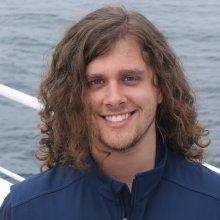
Ian Searles
Tell us about your work / research. What kinds of things do you do?
Throughout my undergraduate career, I have been involved with a number of organizations that focus on broadcast media, video production, and science communication. Some of the research I have been involved in focuses on media impacts in society and how our emotions can be shaped by what we see. I have also been involved with a Solar Car Team as their Video Productions Manager. My main focuses are largely using media as a tool to not only inform the public but to also encourage engagement with the natural world we are a part of.
What sparked your initial interest in your career?
While growing up, my friends and I were always interested in making short videos for social media, and we had a lot of fun doing it. I was also very interested in nature documentaries throughout my life. Upon coming to college, it only made sense for me to combine these interests and allow myself to do something I love. I chose to go into science communication because I feel one of the most important things we can do is strive to understand the world around us. There is so much room for exploration and education when it comes to nature, and specifically the ocean, that the possibilities for media are nearly endless.
Who influenced you or encouraged you the most?
The person that really made me focus on environmental communication is filmmaker Louie Psihoyos. He has directed the documentaries The Cove and Racing Extinction. These films really inspired me to take action and get involved with sharing information. After meeting Louie during my freshman year of college, this drive grew stronger and I decided to devote my life to it.
What element of your work / study do you think is the most fascinating?
I love this field of study because the first part of every project is learning. I get to and will continue to learn about so many different aspects of life and the earth. I also get the opportunity to speak with world-renowned experts in their fields of study, and it's truly an honor to get to work with them.
What other jobs led you to your current career?
Due to being a college student, my experience in this field comes more from student activities and organizations. From live broadcast clubs to the Vice President of my university's sailing team, I have shaped my college career to allow me to be on the water and focus on media.
What are your degrees and certifications?
I am currently working towards my B.S. in Journalism and Mass Communications and Environmental Studies.
What are your hobbies?
I love reading, producing video, playing guitar and piano, sailing, hiking, and camping.
What advice would you give to someone who wants to have a career like yours?
Be proactive. Classes are great at teaching you the technical side of things and the knowledge needed for the future, but gaining experience is really in your own hands. Join organizations and fill your free time with projects you enjoy. Also, use every opportunity you can to build connections. Reach out to people in the fields you want to go into and ask if you can interview them or shadow them. My dad always tells me "there's only one way to guarantee you won't get it, and that's to not try." I feel this advice is applicable basically everywhere so just get out and do it.
How did you get involved with the Nautilus Exploration Program? How did you get on the ship?
During my marine biology class during sophomore year, our teaching assistant was sharing some images from her time aboard the E/V Nautilus. Upon noticing that there were a lot of videos online from the program, I decided to ask her if there were video internship opportunities. She told me about the program and I applied shortly thereafter.
Expeditions
Ian participated in the following Ocean Exploration Trust expeditions:
